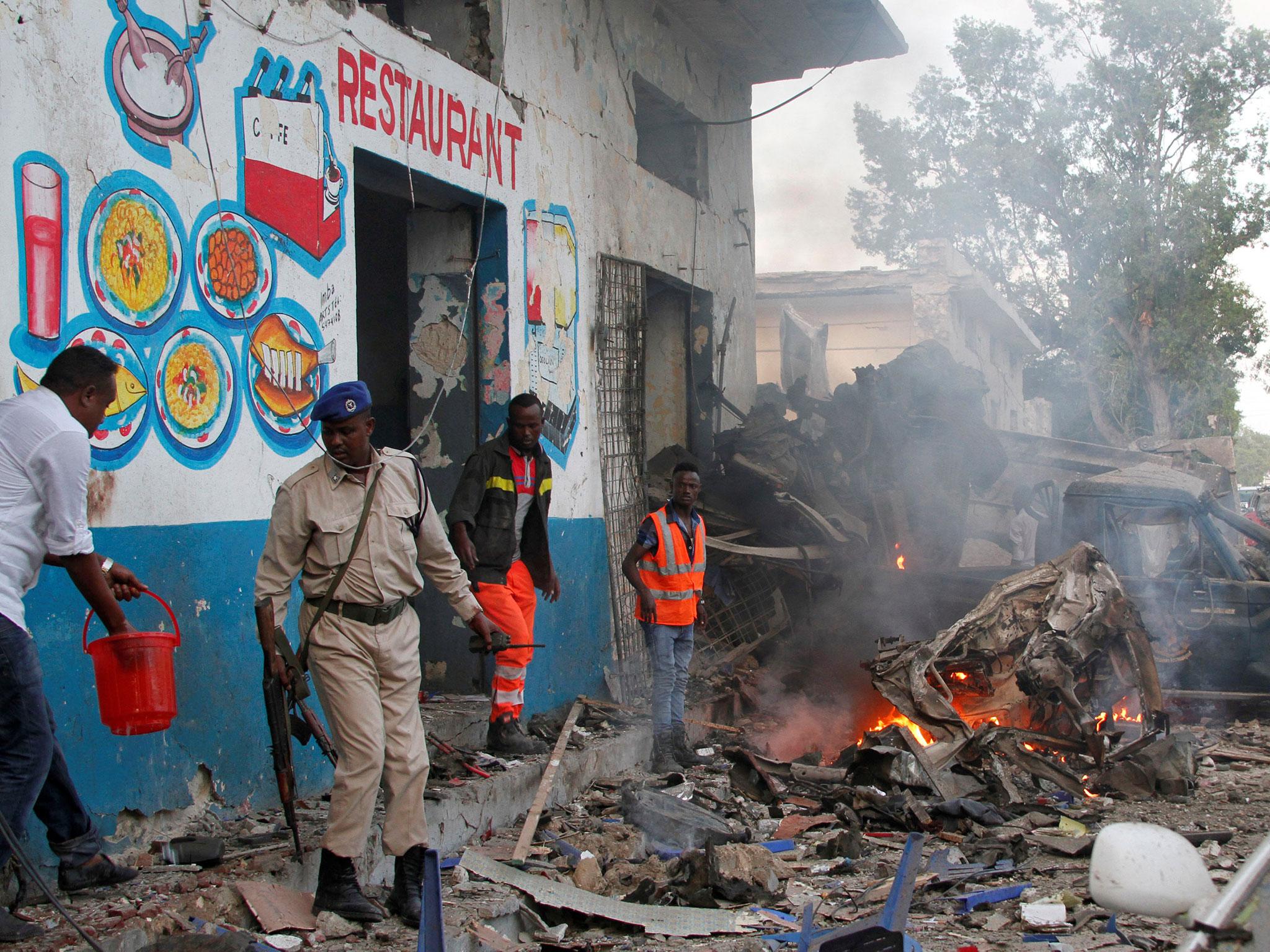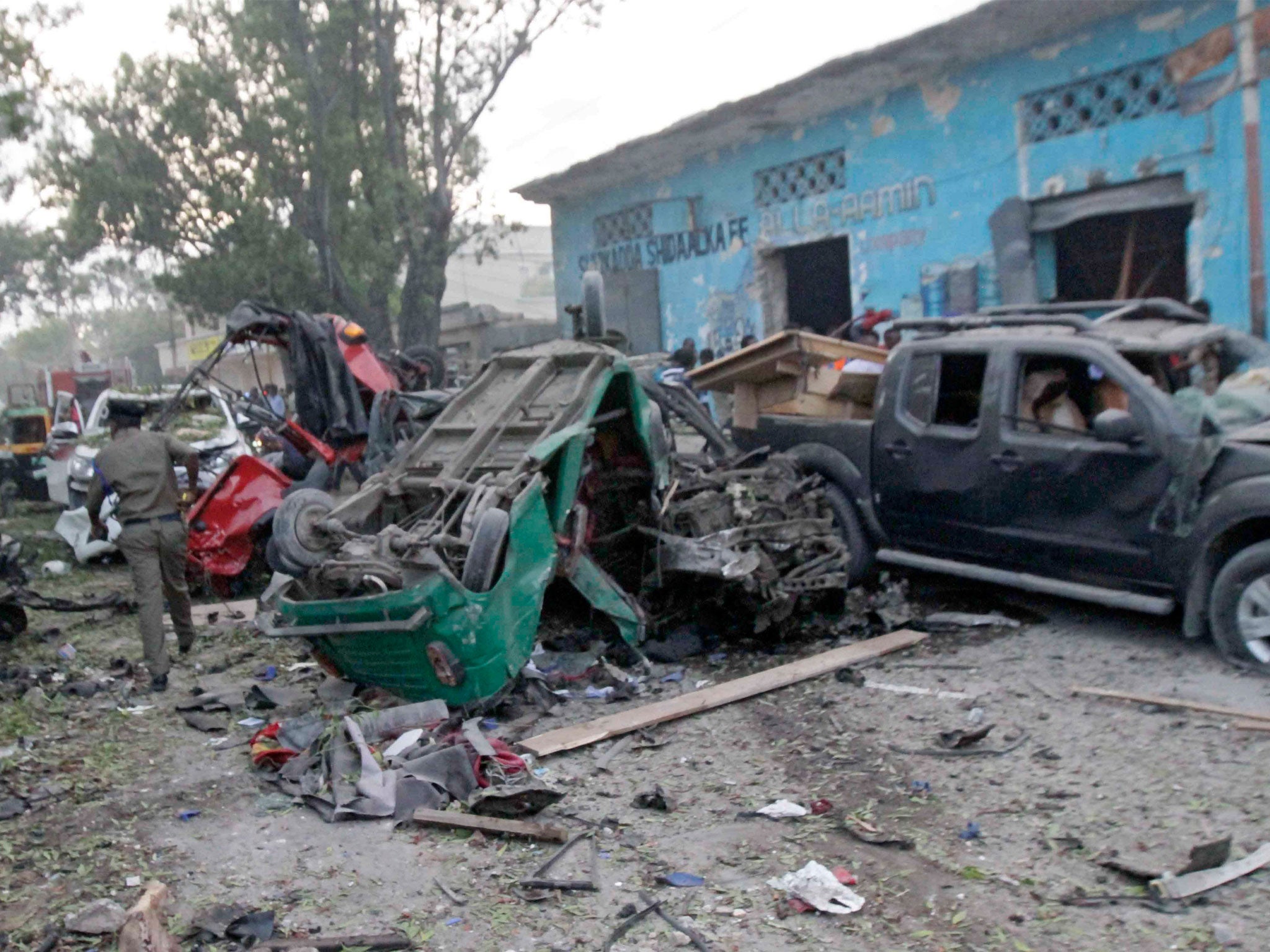Mogadishu attacks: Death toll from Islamist car bombing and siege of hotel in Somalia rises to 25
Attack comes two weeks after more than 350 people killed in massive bomb blast

Your support helps us to tell the story
From reproductive rights to climate change to Big Tech, The Independent is on the ground when the story is developing. Whether it's investigating the financials of Elon Musk's pro-Trump PAC or producing our latest documentary, 'The A Word', which shines a light on the American women fighting for reproductive rights, we know how important it is to parse out the facts from the messaging.
At such a critical moment in US history, we need reporters on the ground. Your donation allows us to keep sending journalists to speak to both sides of the story.
The Independent is trusted by Americans across the entire political spectrum. And unlike many other quality news outlets, we choose not to lock Americans out of our reporting and analysis with paywalls. We believe quality journalism should be available to everyone, paid for by those who can afford it.
Your support makes all the difference.The death toll from an Islamist attack on a hotel in the Somali capital of Mogadishu has risen to 25 after a near 12-hour siege, police said.
Five extremists stormed the Nasa-Hablod hotel after a suicide car bomber detonated an explosives-laden vehicle at the entrance gate.
The explosion destroyed the front of the three-storey hotel and twisted vehicles, causing massive damage to nearby buildings which were left with only their walls standing.
The attackers then invaded the hotel and gunfire continued as security forces fought them inside the building. Two more blasts were heard, one when an attacker detonated a suicide vest.
Al-Shabaab, Africa's deadliest Islamist group, quickly claimed responsibility for Saturday's attack, two weeks after more than 350 people were killed by a massive truck bomb in a busy Mogadishu street in Somalia's worst attack.
The siege ended on Sunday morning after troops regained control of the hotel, having killed three attackers and captured two alive.

"The death toll rises to 25 people including police, hotel guards and residents. The death toll may rise. We suspect some other militants disguised themselves and escaped with the residents who were rescued," police officer Major Mohamed Hussein told Reuters.
"Three militants were captured alive and two others blew up themselves after they were shot," he added.
Included in the dead were a mother and three children, including a baby, all shot in the head, Mr Hussein said. Other victims included a senior Somali police colonel, a former MP and a former government minister.
The bomber had pretended his truck had broken down outside the gate, police colonel Mohamed Abdullahi told the Associated Press, stopping outside the heavily-fortified hotel and pretending to repair the vehicle before detonating it.

Al-Shabaab often targets high-profile areas of Mogadishu. Although it quickly said it carried out Saturday's attack, it has not commented on the bombing two weeks ago. Experts have said the death toll in the earlier bombing was so high that the group hesitated to alienate Somali citizens.
Somalia's president Mohamed Abdullahi Mohamed said the new attack was meant to instil fear in Somalis who united after the 14 October bombing, marching in the thousands through Mogadishu in defiance of al-Shabaab.
Since that blast, the president has visited regional countries to seek more support for the fight against the militant group, vowing a "state of war".
The US military has also stepped up military efforts against al-Shabaab this year in Somalia, carrying out nearly 20 drone strikes, as the global war on extremism moves deeper into the African continent.
A 22,000-strong multinational African Union force in Somalia is expected to withdraw its forces and hand over the country's security to the Somali military by the end of 2020.
US military officials and others in recent months have expressed concern that Somali forces are not yet ready to take over.
The two attacks this month have shaken public confidence in the ability of Somali army to take over from the African Union forces. Many in the capital accuse the government of not doing enough to protect them.
Subscribe to Independent Premium to bookmark this article
Want to bookmark your favourite articles and stories to read or reference later? Start your Independent Premium subscription today.
Join our commenting forum
Join thought-provoking conversations, follow other Independent readers and see their replies
Comments